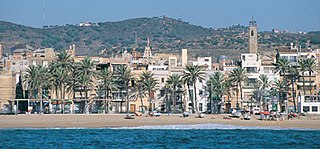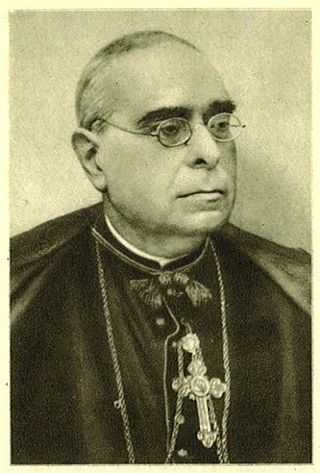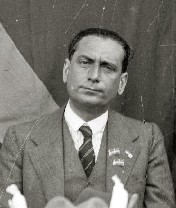Related Research Articles

Badalona is a municipality in Barcelonès county, in Catalonia (Spain). It is located to the north east of Barcelona, on the left bank of the Besòs River and on the Mediterranean Sea, in the Barcelona metropolitan area. By population, it is the third largest city in Catalonia and the twenty-third in Spain. It became a city in 1897.

Sabadell is a city and municipality in Catalonia, Spain. It is in the south of the comarca of Vallès Occidental, where it is one of the two capitals, the other being Terrassa. It is located on the River Ripoll, 20 km (12 mi) north of Barcelona, 190 m (620 ft) above sea level.
Josefina Tanganelli Plana was a Catalan cartoonist and painter.

Josep Feliu i Codina was a Catalan journalist, novelist and playwright whose work is linked to the Realist movement and to the Catalan Renaixença.
The first complete Catalan Bible translation was produced by the Catholic Church, between 1287 and 1290. It was entrusted to Jaume de Montjuich by Alfonso II of Aragon. Remains of this version can be found in Paris.

The national symbols of Catalonia are flags, icons or cultural expressions that are emblematic, representative or otherwise characteristic of Catalonia or Catalan culture.

Josep Torras i Bages, born at Les Cabanyes, Alt Penedès, on 12 September 1846, died at Vic, Osona, on 7 February 1916, was a Catalan thinker, writer, and bishop. He was one of the main figures in the turn of the 20th century Catholic Catalan nationalism.
Seny is a form of ancestral Catalan wisdom or sensibleness. It involves well-pondered perception of situations, level-headedness, awareness, integrity, and right action: "a kind of refined good sense and self-realization."

Manuel Carrasco i Formiguera, was a Spanish lawyer and Christian democrat Catalan nationalist politician. His execution, by order of Francisco Franco, provoked protests from Catholic journalists such as Joseph Ageorges, the President of the International Federation of Catholic Journalists. Ageorges wrote, "Even more than the death of the Duke of Enghien stained the memory of Napoleon, the death of Carrasco has stained the reputation of Franco". Such protests, in turn, provoked the anger of the Francoist press. His funeral in Paris on 27 April 1938 was attended by many notable people, including Joan Miró, Ossorio y Gallardo, Josep M. de Sagarra, Joaquim Ventalló and Jacques Maritain and his wife Raissa.
The Premi d'Honor de les Lletres Catalanes is an award instituted by Omnium Cultural since 1969 to recognize a person by their scientific or literary work, written in Catalan language, the importance of their work and his/her significant contribution to cultural life of the Catalan Countries.

Joan Junceda, full name Joan García Junceda i Supervia, was one of the most important Catalan artists and illustrators in the first half of the 20th century. His father was from Asturian origin. Junceda worked in many publications, including ¡Cu-Cut!, Papitu, Picarol and En Patufet.

¡Cu-cut! was a Catalan illustrated satirical magazine, written in Catalan. Published in Barcelona between 1902 and 1912, it followed the political line marked by Francesc Cambó's Lliga Regionalista.

L'Esquella de la Torratxa was an illustrated satirical weekly magazine, written in Catalan. Published in Barcelona between 1872 and 1939, it was well known for its pro-republican and anti-clerical stance and would become one of the most important Catalan publications of all times.

Maria del Pilar Maspons i Labrós was a Spanish poet, novelist and writer of Catalan descent. Writing under the pseudonym Maria de Bell-lloc, that she used her entire career, she is notable as one of the first Spanish women folklorists and the first woman novelist to be published in Catalan.

Teresa Mañé i Miravet (1865–1939), also known by her pen name Soledad Gustavo, was a Catalan teacher, editor and writer. As a proponent of progressive education, Mañé founded some of the first secular schools in Catalonia. With her husband Joan Montseny, she edited the magazine La Revista Blanca, in which she elaborated her ideas on anarchism, feminism and pedagogy. Her daughter Frederica Montseny i Mañé went on to become a leading figure in the Spanish anarchist movement and the Minister of Health of the Second Spanish Republic.

Francoism in Catalonia was established within Francoist Spain between 1939 and 1975, following the Spanish Civil War and post-war Francoist repression. Francisco Franco's regime replaced Revolutionary Catalonia after the Catalonia Offensive at the end of the war. The dictatorship in Catalonia complemented the suppression of democratic freedoms with the repression of Catalan culture. Its totalitarian character and its unifying objectives meant the imposition of a single culture and a single language, Castillian. The regime was specifically anti-Catalan, but this did not stop the development of a Catalan Francoism that was forged during the war and fed by victory.

Joan Montseny i Carret (1864–1942), who also wrote under the pseudonym Federico Urales, was a Catalan anarchist activist and journalist from Spain.

La Veu de Catalunya was a Catalan newspaper founded by Enric Prat de la Riba that was published in Barcelona from 1 January 1899 to 8 January 1937, with two editions daily.

Destino was a Spanish weekly magazine published in Spain between 1937 and 1980, initially in Burgos and from 1939 in Barcelona.
References
- ↑ Joan Junceda: l’Enciclopèdia – enciclopedia.cat Archived 2012-02-19 at the Wayback Machine
- ↑ Bon seny, aforismes, faules i acudits; Balmes DL, Barcelona 1984
- ↑ Diccionari de la Literatura Catalana, 2008